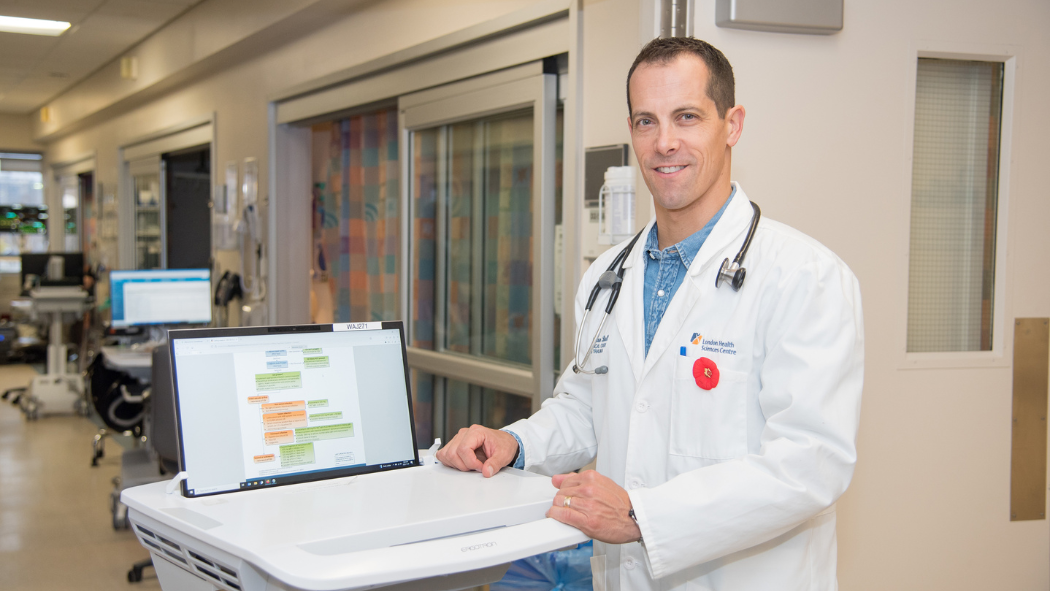
Photo: Dr. Ian Ball with screen showing the digital clinical pathways and guidelines developed by the Antimicrobial Stewardship Program
November 20, 2023
Working in Critical Care Trauma Centre (CCTC) at London Health Sciences Centre (LHSC), Dr. Ian Ball knows first-hand the impact that antimicrobial resistant organisms can have on patients. The CCTC team works closely with their pharmacists and the Antimicrobial Stewardship Team to ensure patients are not being overprescribed medications that can encourage the growth of these bacteria.
During their rounds, the CCTC team looks at each patient and discusses the medications they are currently prescribed. When a patient does not need to be on antibiotics, it’s much safer if they are not prescribed, as it reduces any potential complications including allergies, development of C. difficile infection and potential development of antimicrobial resistant organisms.
“When I started in medicine 20 years ago, antimicrobial resistant organisms weren’t as big of a concern as they are today,” explains Dr. Ball. “Now, drug-resistant bacteria are that background threat that is always there, with patients having a risk of infection causing death, similar to the pre-penicillin era.”
We can all play a role in helping reduce and prevent the emergence and spread of drug-resistant bacteria (also known as “superbugs”).
What can you do to help prevent the spread of antimicrobial drug resistant organisms?
1. Proper hand hygiene
Proper hand hygiene - wash and scrub your hands diligently for at least 15 seconds and turn off the faucet using a paper towel; or use alcohol-based hand rub if hands are not dirty.
2. Keep up-to-date with your vaccinations
Keep up-to-date with your vaccinations, including COVID-19 and an annual flu shot.
3. Maintain a healthy active lifestyle
Maintain a healthy active lifestyle to reduce your need to visit the hospital.
4. Keep healthy food handling habits
Keep healthy food handling habits - thoroughly clean and cook your food.
5. Be aware that not all infections need antibiotics.
Be aware that not all infections need antibiotics. Antibiotics are not effective for treating viruses, for example, the cold or flu, or COVID-19 infection.
6. Use antibiotics appropriately
Use antibiotics appropriately, follow the directions from your health-care provider and only use when prescribed.
7. Dispose of antimicrobials or antibiotics properly
Dispose of antimicrobials or antibiotics properly. Do not share antibiotics prescribed for you, with others, or save them for future use.
LHSC’s efforts to reduce antimicrobial resistance are led by the Antimicrobial Stewardship Team, who develop clinical pathways and treatment guidelines to help guide responsible antibiotic use, review antimicrobial use in the CCTC and Intensive Care Unit, provide teaching sessions across the hospital, and assess antimicrobial agents for formulary use.